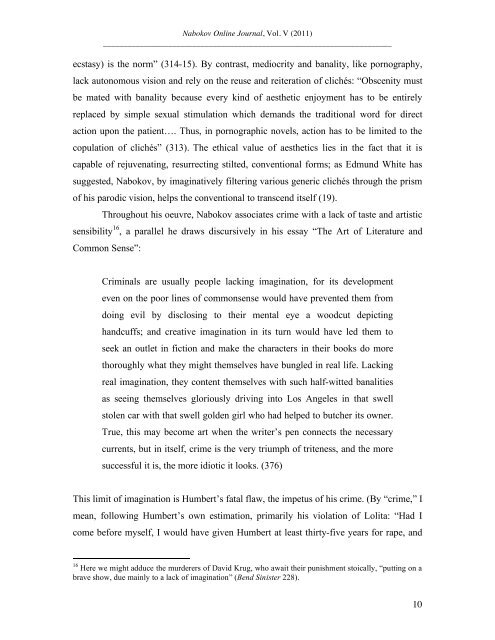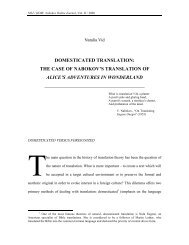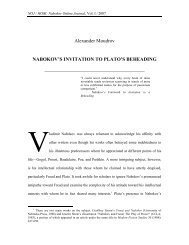You also want an ePaper? Increase the reach of your titles
YUMPU automatically turns print PDFs into web optimized ePapers that Google loves.
Nabokov Online Journal, Vol. V (2011)<br />
_______________________________________________________________________<br />
ecstasy) is the norm” (314-15). By contrast, mediocrity and banality, like pornography,<br />
lack autonomous vision and rely on the reuse and reiteration of clichés: “Obscenity must<br />
be mated with banality because every kind of aesthetic enjoyment has to be entirely<br />
replaced by simple sexual stimulation which demands the traditional word for direct<br />
action upon the patient…. Thus, in pornographic novels, action has to be limited to the<br />
copulation of clichés” (313). The ethical value of aesthetics lies in the fact that it is<br />
capable of rejuvenating, resurrecting stilted, conventional forms; as Edmund White has<br />
suggested, Nabokov, by imaginatively filtering various generic clichés through the prism<br />
of his parodic vision, helps the conventional to transcend itself (19).<br />
Throughout his oeuvre, Nabokov associates crime with a lack of taste and artistic<br />
sensibility 16 , a parallel he draws discursively in his essay “The Art of Literature and<br />
Common Sense”:<br />
Criminals are usually people lacking imagination, for its development<br />
even on the poor lines of commonsense would have prevented them from<br />
doing evil by disclosing to their mental eye a woodcut depicting<br />
handcuffs; and creative imagination in its turn would have led them to<br />
seek an outlet in fiction and make the characters in their books do more<br />
thoroughly what they might themselves have bungled in real life. Lacking<br />
real imagination, they content themselves with such half-witted banalities<br />
as seeing themselves gloriously driving into Los Angeles in that swell<br />
stolen car with that swell golden girl who had helped to butcher its owner.<br />
True, this may become art when the writer’s pen connects the necessary<br />
currents, but in itself, crime is the very triumph of triteness, and the more<br />
successful it is, the more idiotic it looks. (376)<br />
This limit of imagination is Humbert’s fatal flaw, the impetus of his crime. (By “crime,” I<br />
mean, following Humbert’s own estimation, primarily his violation of Lolita: “Had I<br />
come before myself, I would have given Humbert at least thirty-five years for rape, and<br />
16 Here we might adduce the murderers of David Krug, who await their punishment stoically, “putting on a<br />
brave show, due mainly to a lack of imagination” (Bend Sinister 228).<br />
10

















